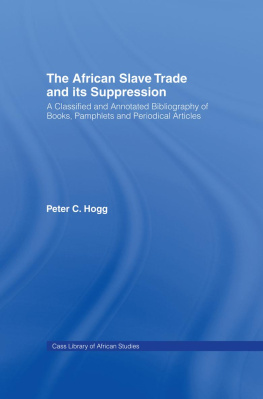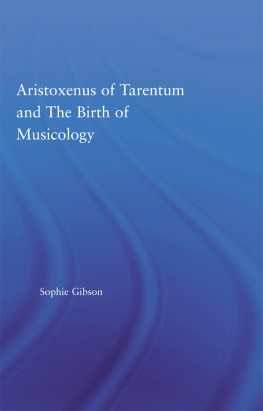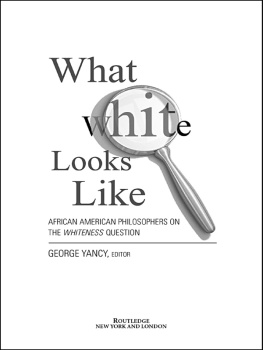CASS LIBRARY OF AFRICAN STUDIES
GENERAL STUDIES
No. 137
Editorial Adviser: JOHN RALPH WILLIS
Department of History, University of California, Berkeley
The African Slave Trade and its Suppression
The African Slave Trade and its Suppression
A Classified and Annotated Bibliography of Books, Pamphlets and Periodical Articles
Peter C. Hogg, B.A., F.L.A.
First published 1973 by
FRANK CASS AND COMPANY LIMITED
Published 2013 by Routledge
2 Park Square, Milton Park, Abingdon, Oxon OX14 4RN
711 Third Avenue, New York, NY, 10017, USA
Routledge is an imprint of the Taylor & Francis Group, an informa business
Copyright 1973 PETER C. HOGG
Library of Congress Catalog Card No. 72 90130
All rights reserved. No part of this publication may be reproduced in any form or by any means, electronic, mechanical, photocopying, recording or otherwise, without the prior permission of the publisher.
Publishers Note
The publisher has gone to great lengths to ensure the quality of this reprint but points out that some imperfections in the original may be apparent
ISBN 13: 978-0-714-62775-5 (hbk)
Contents
This bibliography is based on one submitted and accepted for Fellowship of the Library Association in 1970. I am indebted to Mr Allan Chapman, F.L.A., who as my supervisor guided the work to a successful conclusion.
I am also grateful to colleagues in the British Museum Library who drew my attention to relevant literature, to a number of librarians in Britain and abroad who were most helpful in answering my enquiries, and above all to my wife for her encouragement and assistance.
I dedicate the work to the memory of Christian Okechukwu Ahakpo and his comrades: ka onwu ha nwuru awughi na ihi.
As the literature of the African slave trade comprises books, pamphlets and periodical articles in a variety of languages published from the sixteenth century to the present day it is difficult for any individual compiler to assemble bibliographical information about more than a representative selection of the material available. This bibliography can therefore only aspire to serve as a guide to the main categories of printed material on the subject in western languages, and the user should be warned that it has an unavoidable bias towards English-language material. I have excluded manuscripts and kept government publications to a minimum as the latter alone would run into thousands.
Slavery and trade in slaves existed in parts of Africa from the beginning of recorded history. Information on the ancient and medieval slave trade must be pieced together from brief references in classical and Arabic literature. A similar scarcity of sources obtains for the first century or so of European participation in the trade which was begun in a small way by the Portuguese on the Atlantic coast in the 1440s. Only the European colonisation of the Americas created the demand for cheap labour which led to the enormous expansion of the African slave trade between the sixteenth and the nineteenth century. This basic economic function of the trade is the dominant theme of the literature on the subject, whether practical or polemical.
For historical and geographical reasons European literature dealing with the slave trade was always largely concerned with its West African sectors as these constituted one of the vital base lines in the triangular trade between Europe, Africa and the Americas which sustained the Atlantic economic system for three centuries. Not until the European slave trade was being suppressed in the nineteenth century was attention concentrated on the sources of the Muslim slave trade in the Sudan and East Africa.
Although a fair amount of manuscript records survive from the sixteenth century very little information on the slave trade was published in that period apart from accounts of voyages like those of C da Mosto and Hawkins. But this century already saw the beginnings of the controversy about the justification of the trade in the works of a few Catholic theologians. The only great markets for slaves in this period were of course the Spanish and Portuguese colonies in tropical America.
In the seventeenth century the Iberian monopoly of the Atlantic slave trade was broken by the new maritime powers of Europe, the Netherlands, England and France, with Denmark and, for a short period, Brandenburg in their wake. All of these states followed the established pattern by acquiring colonies in the New World linked to commercial footholds in West Africa from which slaves could be supplied. This new economic order was reflected in the appearance of geographical and commercial works on Africa by writers of all the new colonial countries. At the same time, however, Protestants joined the Catholics in the sporadic controversy on the slavery issue and by the end of the century several outright attacks on the slave trade had been published, as an omen of the future, by English nonconformists in America.
The eighteenth century is the classical period of the mercantilist European slave trade, marked by further expansion and legal regulation of the system. England gained supremacy in this field, symbolised by her acquisition in 1713 of the asiento contract to supply the Spanish-American colonies with African slaves. An increasing number of books and pamphlets on the African trade resulted from the intensified commercial competition between the European colonial powers and between rival economic groups within these states. At the same time more factual information on the trade was being supplied by traders, missionaries, officials and travellers along the African coast.
The heightened economic competition and the increasing knowledge about the African slave trade caused a growing revulsion in European public opinion against this traffic in men. From the middle of the eighteenth century the new school of rationalists subjected the whole system to a radical critique, while its religious opponents also progressed in the 1760s to moral, legal and economic arguments for its abolition. The leading polemicists in this period were the Americans Benezet and Woolman and the Englishman Granville Sharp, who in 1772 demonstrated by a test case that slavery was not legally sanctioned in England. Simultaneously imaginative literature on African themes developed an antislavery tendency and began to serve as an additional weapon in the abolition controversy.
The growing number of publications devoted at this time to the slavery issue illustrates the increasing momentum of the abolition movement which led to the formation of antislavery societies in New England, Britain and France by 178788 and the launching of organised political campaigns for the abolition of the slave trade. The years 178892 mark the high tide of the resulting pamphlet warfare. Then the establishment of the revolutionary French republic and the successful slave revolt in Haiti provoked a conservative reaction in Britain where the anti-slave trade campaign soon stalled, while in France the matter appeared to be settled by the abolition of colonial slavery in 1794.
When the nineteenth century opened the slavery question was overshadowed by war in Europe. In 1802, although Denmark withdrew from the slave trade, France actually restored slavery in her colonies and only waited for an opportunity to reopen the slave trade. However, for a combination of economic and moral reasons both Britain and the United States decided in 1807 to end their participation in the slave trade from Africa. From then on it was in their own interest to ensure that their economic rivalsFrance, Spain, Portugal and the Netherlandsshould also cease to resupply their colonies with African slaves. The United States was divided internally on the slavery issue and it was Britain, with her wider imperial interests, that took the lead in the ensuing political struggle.







